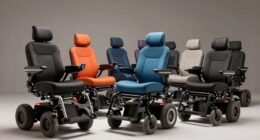Let’s discuss the intricate issues surrounding the potential mental effects that may occur post-anesthesia, especially in older individuals.
While the connection between anesthesia and cognitive decline has been a matter of investigation, the findings have been varied and inconclusive. However, the ongoing studies are shedding light on the intricate relationship between anesthesia and the aging brain.
The impact of anesthesia on cognitive function is a topic that continues to intrigue researchers and medical professionals alike, prompting a closer examination of the mechanisms at play.
Key Takeaways
- Elderly face heightened dementia risk post-anesthesia.
- Anesthesia type and depth impact cognitive outcomes.
- Preoperative assessments and tailored programs mitigate cognitive decline.
- Anesthesia accelerates Alzheimer's pathology, emphasizing the need for risk management.
Risk Factors for Anesthesia Dementia
When considering the risk factors for anesthesia dementia, it's crucial to highlight that patients aged 50 and above undergoing anesthesia and surgery face a nearly twofold increased risk of developing dementia. This heightened risk is particularly significant in older adults undergoing various surgical procedures such as eye, digestive, genitourinary, musculoskeletal, and dermatological surgeries. Additionally, the choice of anesthesia type, including IV/IM, regional, and general anesthesia, can also play a role in increasing dementia risk.
Factors such as the duration and depth of anesthesia may contribute to the pathogenesis of Alzheimer's disease, further emphasizing the importance of understanding these risk factors. Notably, increasing age is a significant risk factor for postoperative cognitive decline and the development of Alzheimer's disease in patients undergoing surgery and anesthesia.
Therefore, healthcare providers must carefully assess and consider these risk factors when planning anesthesia and surgical interventions for older adult patients to mitigate the potential risks associated with anesthesia dementia and cognitive decline.
Cognitive Impairment Post-Anesthesia

Considering the heightened risk of developing dementia in older adults undergoing anesthesia and surgery, it's essential to address the occurrence of postoperative cognitive impairment, which can affect up to 65% of elderly patients. Anesthesia, especially in older individuals, may impede brain cell repair processes, potentially leading to long-term cognitive effects. Research indicates that anesthesia could exacerbate age-related brain changes and contribute to cognitive decline over time.
Postoperative cognitive complications such as delirium and cognitive dysfunction aren't uncommon, impacting approximately 10% of elderly patients with lasting cognitive decline. Opting for local or regional anesthesia in individuals with preexisting cognitive decline or dementia can help manage postoperative cognitive impairment effectively. Understanding the risks associated with anesthesia in the elderly population is crucial in providing optimal care and minimizing the potential for long-lasting cognitive consequences.
Mechanisms of Anesthesia Dementia
Inhalation anesthetics such as sevoflurane have been implicated in triggering mechanisms associated with dementia by facilitating the accumulation of β-amyloid proteins in the brain. Exposure to these anesthetics, like sevoflurane and isoflurane, can worsen Alzheimer's disease-related changes, including tau phosphorylation.
Studies in animals have demonstrated cognitive dysfunction and tau hyperphosphorylation following anesthesia exposure, suggesting a potential connection to Alzheimer's disease progression. Notably, anesthesia, especially under propofol, has been linked to cognitive impairment and amyloid pathology, shedding light on how anesthesia impacts dementia.
The acceleration of Alzheimer's disease progression by anesthetic agents through their influence on brain pathology underscores the intricate relationship between anesthesia and the mechanisms underlying dementia. Understanding these anesthesia mechanisms is crucial for developing strategies to mitigate the impact of anesthesia on cognitive function and brain health.
Mitigating Anesthesia Dementia Effects

Exploring strategies to mitigate the cognitive impact of anesthesia and surgery on older individuals involves implementing tailored prehabilitation programs and optimizing preoperative health assessments to address modifiable risk factors for postoperative neurocognitive disorders. These interventions are crucial in reducing the incidence and severity of anesthesia-related cognitive decline in older patients undergoing surgery. Below is a table summarizing key approaches in mitigating anesthesia dementia effects:
| Strategies | Description |
|---|---|
| Preoperative health assessments | Identify and optimize modifiable risk factors for postoperative neurocognitive disorders (PNDs) related to anesthesia and surgery. |
| Tailored prehabilitation programs | Significant reductions in rates of postoperative delirium, a common complication linked to anesthesia-related cognitive decline. |
| Medication management during perioperative period | Avoiding certain medications can help lower the risk of cognitive impairment associated with anesthesia in older surgical patients. |
| Evidence-based programs like Hospital Elder Life Program | Effective in reducing the incidence and severity of postoperative cognitive dysfunction. |
| Patient-specific prehabilitation programs and lifestyle recommendations | Play a crucial role in mitigating the cognitive effects of anesthesia and surgery on older individuals, enhancing overall cognitive outcomes postoperatively. |
Implementing these strategies can help optimize cognitive outcomes and enhance the postoperative recovery experience for older surgical patients.
Future Research Directions
Future research should prioritize investigating the specific mechanisms through which anesthesia exacerbates dementia-related pathology in the brain. To delve deeper into this complex relationship, researchers could focus on:
- Long-term Cognitive Outcomes: Examining the lasting effects of different types and durations of anesthesia on cognitive function and dementia risk can provide critical insights into the impact on brain health.
- Perioperative Factors and Genetic Predispositions: Exploring the interplay between anesthesia exposure, perioperative variables, and genetic predispositions to dementia will help unravel individual susceptibilities to cognitive decline.
- Inflammatory Responses and Neurotransmitter Imbalances: Investigating the role of inflammation, oxidative stress, and neurotransmitter disruptions in the context of anesthesia and dementia could unveil potential targets for preventative strategies or interventions.
Frequently Asked Questions
How Long Does Anesthesia Dementia Last?
We can't provide a specific duration for anesthesia dementia without further context. It's crucial to assess each case individually.
Post-surgery cognitive issues typically resolve quickly, but persistent problems may signal a deeper concern. Research is ongoing to understand the impact of anesthesia on cognitive health long-term.
If experiencing cognitive decline after surgery, seeking medical evaluation is important to address potential underlying issues like dementia.
How Does Anesthesia Affect Someone With Dementia?
When someone with dementia undergoes anesthesia, it can impact their cognitive functions. The effects may vary based on the individual's condition, with potential risks of postoperative delirium and cognitive decline.
It's crucial to carefully manage anesthesia in such cases to minimize these risks. Tailoring the anesthesia approach and closely monitoring the patient post-surgery are essential steps in ensuring a successful outcome for individuals with dementia undergoing anesthesia.
Who Should Not Be Put Under Anesthesia?
Individuals who should avoid anesthesia include those with adverse reactions history, severe heart failure, unstable angina, uncontrolled high blood pressure, or advanced pregnancy. These conditions raise the risk of complications.
Evaluating candidates with severe respiratory issues is crucial. These groups should proceed cautiously when considering anesthesia to prevent potential adverse outcomes.
Can Anesthesia Cause Memory Loss and Confusion?
Absolutely, anesthesia can cause memory loss and confusion in older adults. Some studies show that particular anesthetics might trigger mechanisms associated with cognitive decline post-surgery.
Exposure to general anesthesia, especially inhalation agents like sevoflurane, has been linked to temporary memory impairment in certain individuals. This issue is especially concerning for the elderly population undergoing surgery.
It's crucial to consider these potential cognitive effects when planning anesthesia for older patients.
Conclusion
In conclusion, it's essential to acknowledge the potential cognitive challenges that may arise following anesthesia in older individuals.
While the precise mechanisms of anesthesia dementia remain unclear, it's vital to consider mitigating factors and future research directions to minimize the impact of cognitive decline post-surgery.
By addressing risk factors and implementing strategies to support cognitive function, we can strive towards enhancing the overall well-being of patients undergoing anesthesia procedures.









